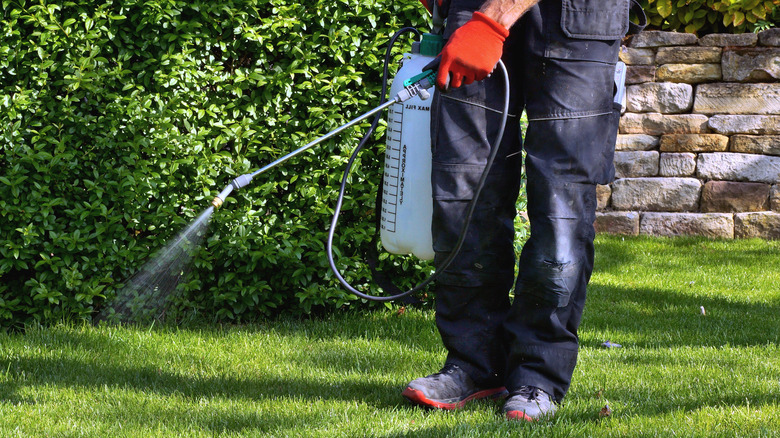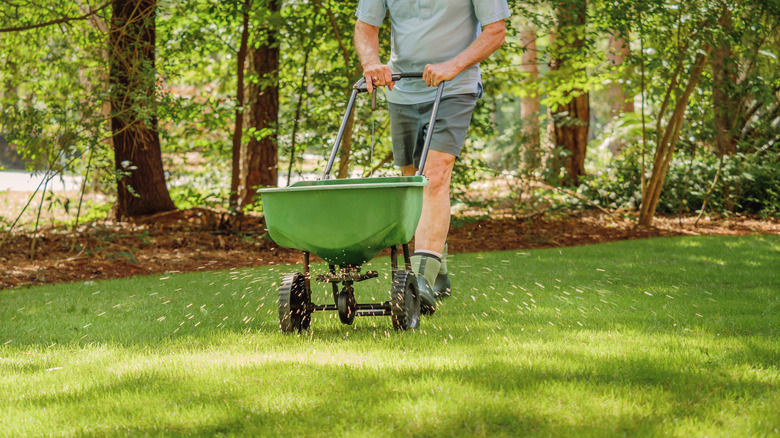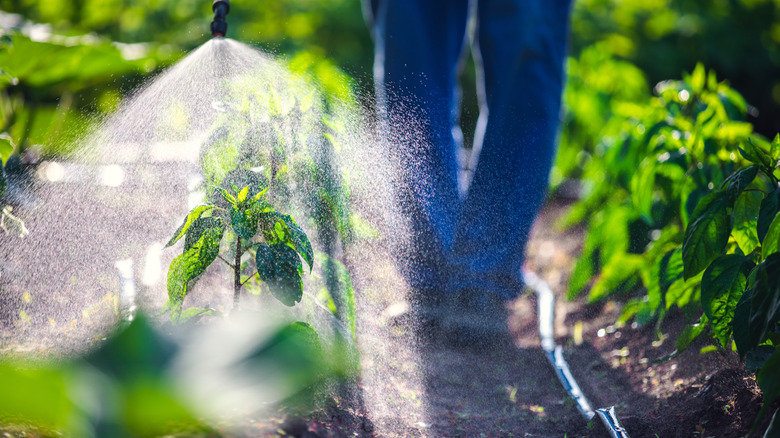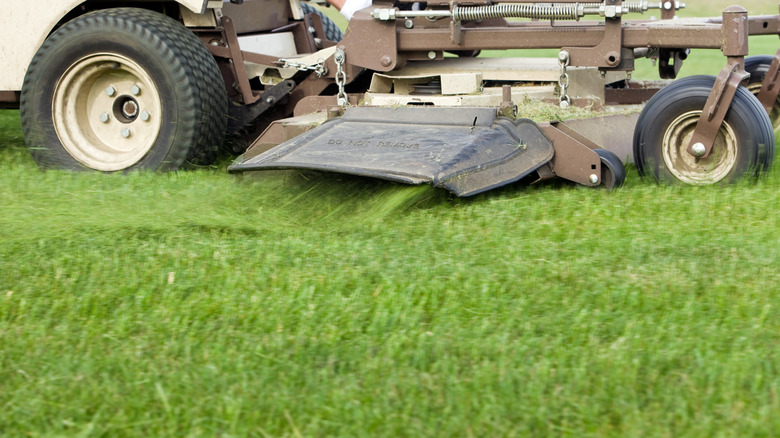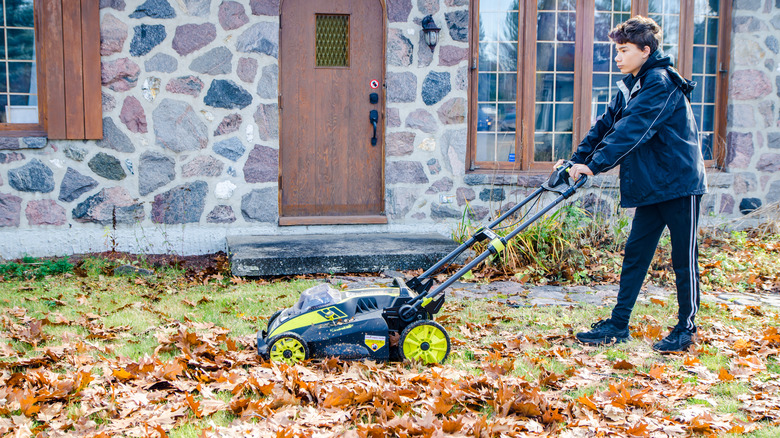How Your Gardening And Lawncare Habits May Be Wreaking Havoc On The Water Supply
It can be difficult to understand how the actions we take with our lawns and gardens can have such a large impact on the quality of water around us. If you live near a stream, lake, or ocean, rain can pick up unabsorbed lawn chemicals and other items. These byproducts of lawn care can then flow into your nearest body of water, called a watershed. The quality of the water you drink and use for hygiene and household tasks is directly affected by the pollutants in your local water supply.
Our gardening habits affect watersheds in many ways. The chemicals we use to make our grass greener, the pesticides we apply to control aphids in our gardens, and even the way we deal with fallen leaves all impact the quality of water around us. Thankfully, by making a few small changes to the way we maintain our outdoor spaces, we can help improve the health of our watershed.
Lawn and garden fertilization
Having a perfect lawn makes your home look tidy, but the cost of using excess fertilizer and herbicides is a high price to pay when you understand how it affects your watershed. Fertilizer applied in the correct amount is generally safe because you give your grass as many nutrients as it can absorb. However, applying fertilizer before heavy rain may be a waste of money if those nutrients wash away before the roots can absorb them. In the same way, any fertilizer that cannot be absorbed is deposited into local waterways. The nitrogen contained in fertilizer leads to the growth of toxic algae blooms and can even kill aquatic creatures. The same rule applies to fertilizing gardens. Over-fertilizing your garden can also lead to imbalances in the soil and nutrient runoff.
To limit the amount of fertilizer you use on your lawn, invest in a mulching lawnmower instead of bagging and sending grass clippings to the landfill. Those tiny pieces of grass are nutrient-rich and break down quickly. This process can greatly reduce or eliminate the amount of fertilizer you need to add by creating a self-fertilizing lawn. In your flower and vegetable gardens, always apply the products in the amount and frequency that the package states. Enough fertilizer is good, but more fertilizer is not better.
Pesticide use
When the ground becomes saturated by water due to excessive irrigation or an exceptionally rainy season, the soil can not absorb anything else. Rather than being filtered through the ground, pesticides on the surface wash away into the nearest water source. This could be a nearby pond where you fish or swim. It could also be a stream that flows further down the path of the watershed into larger bodies of water. If you are using pesticides to manage problem insects in your garden, the active ingredients, additives, and other products in those chemicals affect the quality of your local water supply.
There are many ways to deal with pests that are less damaging to the watershed. Taking advantage of biological pest controls, like attracting ladybugs by adding the plants they love, can help manage those frustrating aphid infestations. Physical barriers like garden fabric can keep flying pests away from your garden plants while allowing sun and rain to come in. Limiting the amount of pesticides you use in your garden and lawn is one simple step to keep those dangerous synthetic chemicals out of the environment.
General maintenance
How you maintain your lawn and garden is just as important as the products you use. Like fertilizer, the herbicides applied to your lawn and garden can easily wash away into local water sources. Popular herbicides containing glyphosate pose a risk to the environment because they do not break down in water if they are washed away. This means this herbicide remains in the watershed indefinitely, harming all levels of aquatic life and affecting the quality of drinking water. When possible, remove minor weeds by hand or use more natural weed control products, like vinegar. When you really need something heavy-duty, consider applying these powerful herbicides by hand instead of broadcast spraying. Simply cut the branches off the unwanted brush or invasive plants, then "paint" the herbicide on the freshly exposed areas to kill the roots.
Disposing of grass and leaves properly is another way to keep excess nitrogen from growing in waterways. We discussed the benefits of mulching your grass, but if you leave grass on the street after mowing, it can get washed into storm sewers, which leads to local streams. Mulching your leaves offers the same effects as mulching your grass. Once the leaves have fallen, go over them a few times with your mower and let them feed your soil throughout the winter. Use a blower to move any clippings or leaves from the street back into your yard.
Organic products
We often think switching to organic products will solve the environmental problems caused by synthetic chemicals, but that is not necessarily the case. Spending more money on organic lawn fertilizer may remove some of those undesirable ingredients from the water supply. But, if you use too much, it will still lead to an overgrowth of toxic algae blooms caused by excess nitrogen in the water supply. Likewise, switching to organic pesticides may make your produce safer to consume, but they still have ingredients that are toxic to organisms that rely on the watershed.
Being a responsible homeowner who wants to help the environment may feel like an overwhelming task, but some changes really are easy and may even save you money! Switching to a mulching mower, using non-chemical pest controls, and changing the way you deal with weeds are fairly easy habits to change. And, once you get the hang of doing things a little differently, you'll be supporting the health of your local watershed without even having to think about it. Maybe your neighbors will notice and make some changes, too.
